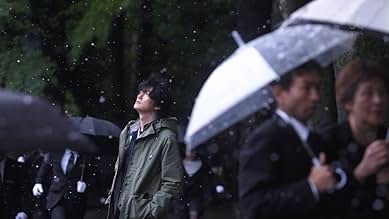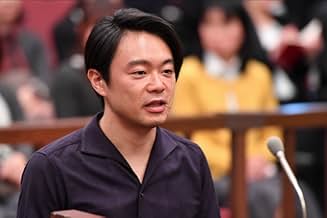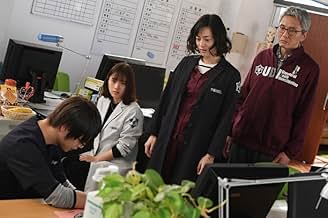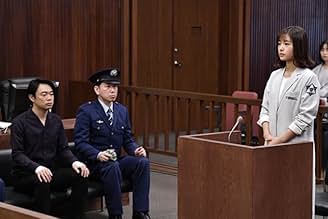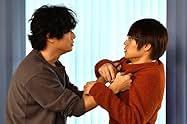CALIFICACIÓN DE IMDb
8.1/10
2.6 k
TU CALIFICACIÓN
Historias de una organización no gubernamental japonesa que trabaja en casos de muertes no naturales y trata de revelar la verdad detrás de las muertes.Historias de una organización no gubernamental japonesa que trabaja en casos de muertes no naturales y trata de revelar la verdad detrás de las muertes.Historias de una organización no gubernamental japonesa que trabaja en casos de muertes no naturales y trata de revelar la verdad detrás de las muertes.
Explorar episodios
Opiniones destacadas
In Japan a new department called Unnatural Death Investigation carries out autopsies on people who have died under suspicious circumstances. The main star of the series is Mikoto Misumi (Satomi Ishiihara) whose family died when she was a child in tragic circumstances. She works alongside another forensic investigator who was a suspect in his girlfriend's death many years earlier and is bitter and twisted. Alongside this dynamic we see the work of the team as they investigate strange and unusual deaths and how they struggle to find the cause. I found it an enjoyable series with interesting side characters and good acting with just a hint of gore which I was thankful for taking into account their job. I was surprised to learn how few autopsies are actually carried out in Japan and how this seems to be accepted the population.
"Unnatural" is your typical procedural, with a body per episode, some character development, and your team interacting with each other while the plot of the episode develops. However, the setting, acting, and touch make this show really enjoyable, even if not particularly original.
The show centers on UDI, the Unnatural Death Investigation unit, an organization that works to discover the truth behind unnatural deaths that occur in Japan. Japan being a country where people are not normally buried, but cremated, which means you cannot go back to those bodies to do another autopsy. The UDI has a couple of lead forensic surgeons, Mikoto Misumi and Kai Nakado, and a group that works around them.
As said above, each episode offers a case, even though there is an overall arc that offers a particular mystery related to one of the characters, and some other mysteries and plot threads that will be developed little by little. The cases are not particularly surprising or original, but they are engaging enough and offer a couple of surprises along the way. The fact that the group has only a short time before the families want to cremate the bodies adds a countdown to the proceedings that make it more nail-biting (even if we have to suffer the 'character-running-to-stop-a-body-of-being-cremated' moment here and there).
The best of the show, however, are the characters and their interactions. Satomi Ishihara is particularly good here, her acting fitting the character better than in some of her other dramas. But the package around her, with Yutaka Matsushige or Masataka Kubota, really helps. Their interactions, banter, and how they are developed is the highlight of the show, with some very touching moments. Yes, the show may try to manipulate the viewer with the music and some particular plot twists, but when you care about the characters and it does it not in an intrusive (or very intrusive) way, you won't care much.
If you want a mystery of the week, with funny characters, and some feelings thrown into the mix, you may enjoy "Unnatural". A good one.
The show centers on UDI, the Unnatural Death Investigation unit, an organization that works to discover the truth behind unnatural deaths that occur in Japan. Japan being a country where people are not normally buried, but cremated, which means you cannot go back to those bodies to do another autopsy. The UDI has a couple of lead forensic surgeons, Mikoto Misumi and Kai Nakado, and a group that works around them.
As said above, each episode offers a case, even though there is an overall arc that offers a particular mystery related to one of the characters, and some other mysteries and plot threads that will be developed little by little. The cases are not particularly surprising or original, but they are engaging enough and offer a couple of surprises along the way. The fact that the group has only a short time before the families want to cremate the bodies adds a countdown to the proceedings that make it more nail-biting (even if we have to suffer the 'character-running-to-stop-a-body-of-being-cremated' moment here and there).
The best of the show, however, are the characters and their interactions. Satomi Ishihara is particularly good here, her acting fitting the character better than in some of her other dramas. But the package around her, with Yutaka Matsushige or Masataka Kubota, really helps. Their interactions, banter, and how they are developed is the highlight of the show, with some very touching moments. Yes, the show may try to manipulate the viewer with the music and some particular plot twists, but when you care about the characters and it does it not in an intrusive (or very intrusive) way, you won't care much.
If you want a mystery of the week, with funny characters, and some feelings thrown into the mix, you may enjoy "Unnatural". A good one.
Unnatural - Was it the first non-anime Japanese drama I ever watched? I'm not entirely sure~
It tells the story of a group of forensic pathologists at Japan's newly established Unnatural Death Investigation Institute (UDI).
Unlike novels, TV dramas don't give you room for imagination. But through visual storytelling (no mental effort required) and synchronized audiovisuals (like the theme song Lemon by Kenshi Yonezu), combined with tightly paced plotting (one standalone case per episode, ten episodes in total), it grips your heart firmly.
This is a detective-mystery genre that Japanese creators excel at, but its ambition goes beyond that.
Suicide organizations, wealth disparity, labor conflicts, family dynamics, school bullying, the role of media-all these are themes explored in the series.
Death is the ultimate question of life's journey.
Aside from this show, another death-themed piece I watched this year was the film The Breaking of the Hell, which, like "Unnatural" , uses death to reflect the chaos and struggles of the living world-those deep questions we often ponder at night.
The ending of this drama responds to a question (or perhaps an answer) that has lingered in my mind for over a decade:
Is the result more important, or the process? Is it acceptable to achieve one's goals by any means necessary?
Of course, the story still delivers a happy ending after choosing the right path. But I know all too well that the real world is often far more complicated. More often than not, what we observe is that "the noble ones have their epitaphs, while the wicked hold their passes."
So, when truly faced with a cruel moment of choice, do we still possess the courage to refuse unprincipled means?
It undoubtedly carries the aura of a masterpiece. After watching it, I personally believe it's well-deserved.
The convictions it upholds, the moments of being loved-all strike a genuine chord.
It tells the story of a group of forensic pathologists at Japan's newly established Unnatural Death Investigation Institute (UDI).
Unlike novels, TV dramas don't give you room for imagination. But through visual storytelling (no mental effort required) and synchronized audiovisuals (like the theme song Lemon by Kenshi Yonezu), combined with tightly paced plotting (one standalone case per episode, ten episodes in total), it grips your heart firmly.
This is a detective-mystery genre that Japanese creators excel at, but its ambition goes beyond that.
Suicide organizations, wealth disparity, labor conflicts, family dynamics, school bullying, the role of media-all these are themes explored in the series.
Death is the ultimate question of life's journey.
Aside from this show, another death-themed piece I watched this year was the film The Breaking of the Hell, which, like "Unnatural" , uses death to reflect the chaos and struggles of the living world-those deep questions we often ponder at night.
The ending of this drama responds to a question (or perhaps an answer) that has lingered in my mind for over a decade:
Is the result more important, or the process? Is it acceptable to achieve one's goals by any means necessary?
Of course, the story still delivers a happy ending after choosing the right path. But I know all too well that the real world is often far more complicated. More often than not, what we observe is that "the noble ones have their epitaphs, while the wicked hold their passes."
So, when truly faced with a cruel moment of choice, do we still possess the courage to refuse unprincipled means?
It undoubtedly carries the aura of a masterpiece. After watching it, I personally believe it's well-deserved.
The convictions it upholds, the moments of being loved-all strike a genuine chord.
Surprisingly nice! The script solid plot development is reasonable, the reversal of the publicity particularly is attractive. In a word, under the banner of indifference and suspense, we are trying to explore the "future science" of forensic medicine itself, and the ethical and moral issues arising from it. There is no absolute right and wrong and justice, but science itself.The warmth of many episodes of science and justice brought tears to my eyes.
Japanese shows are becoming more and more like western shows were they seem to have a need to be lecturing you about a social issue rather than telling you a story or engage you emotionally. This one is not a bad one worth a watch Satomi is not so versatile but shed does a OK job. Stories are not bad, so worth a watch. In response to the reviewer who turns the drama review to a social commentary, please leave political and social comments out of here, if we wanted to get into that we would watch a documentary, (why do some women have to turn everything into being independent makes me think these women intrinsically feel weak so they need to keep talking about it!)
¿Sabías que…?
- TriviaFrom the same fictional universe as MIU 404 which follows two detectives solving crimes.
Selecciones populares
Inicia sesión para calificar y agrega a la lista de videos para obtener recomendaciones personalizadas
- How many seasons does Unnatural have?Con tecnología de Alexa
Detalles
- Tiempo de ejecución54 minutos
- Color
Contribuir a esta página
Sugiere una edición o agrega el contenido que falta

Principales brechas de datos
By what name was Unnatural (2018) officially released in India in English?
Responda
